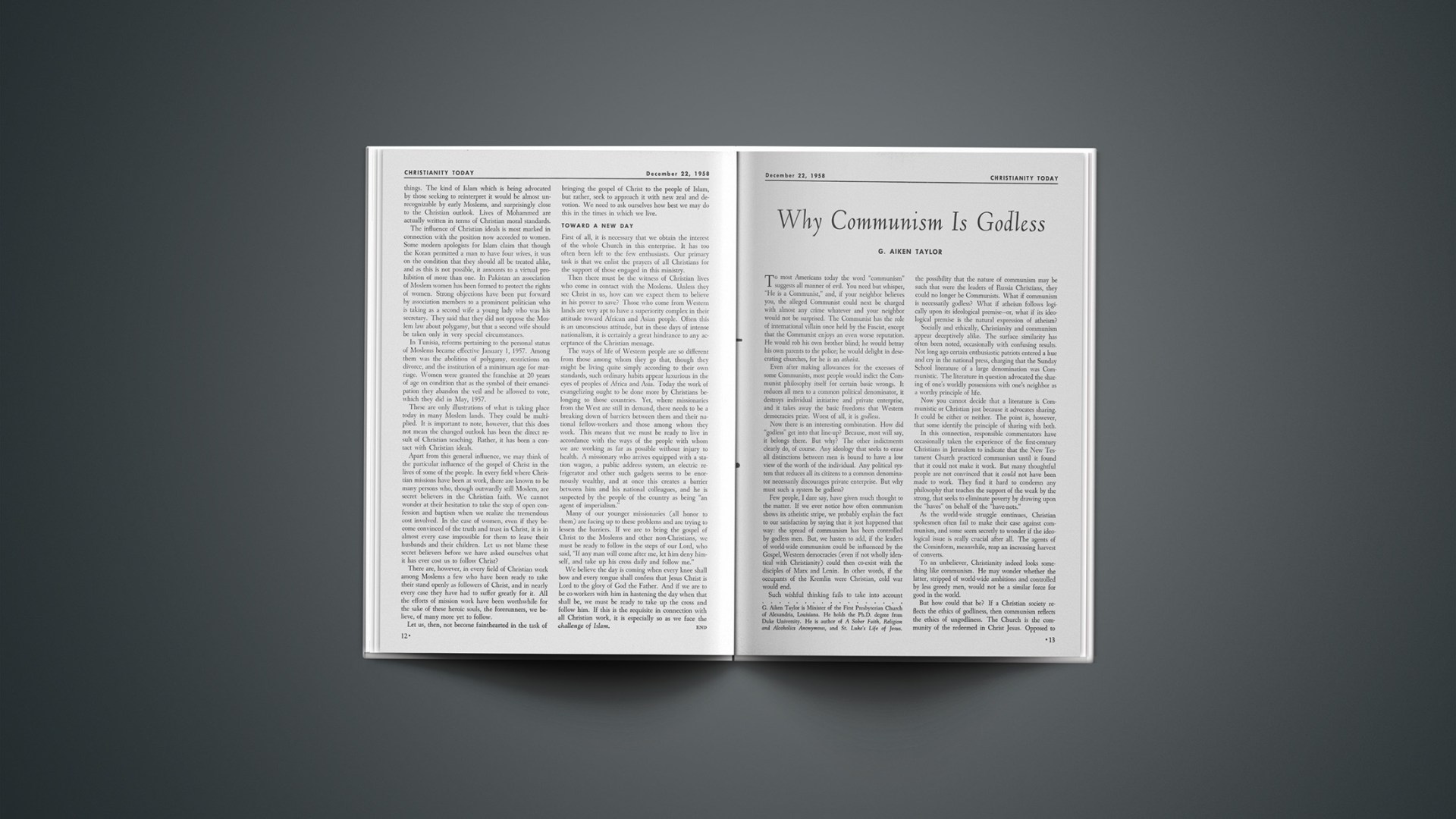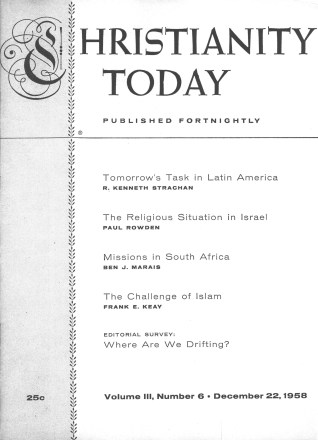To most Americans today the word “communism” suggests all manner of evil. You need but whisper, “He is a Communist,” and, if your neighbor believes you, the alleged Communist could next be charged with almost any crime whatever and your neighbor would not be surprised. The Communist has the role of international villain once held by the Fascist, except that the Communist enjoys an even worse reputation. He would rob his own brother blind; he would betray his own parents to the police; he would delight in desecrating churches, for he is an atheist.
Even after making allowances for the excesses of some Communists, most people would indict the Communist philosophy itself for certain basic wrongs. It reduces all men to a common political denominator, it destroys individual initiative and private enterprise, and it takes away the basic freedoms that Western democracies prize. Worst of all, it is godless.
Now there is an interesting combination. How did “godless” get into that line-up? Because, most will say, it belongs there. But why? The other indictments clearly do, of course. Any ideology that seeks to erase all distinctions between men is bound to have a low view of the worth of the individual. Any political system that reduces all its citizens to a common denominator necessarily discourages private enterprise. But why must such a system be godless?
Few people, I dare say, have given much thought to the matter. If we ever notice how often communism shows its atheistic stripe, we probably explain the fact to our satisfaction by saying that it just happened that way: the spread of communism has been controlled by godless men. But, we hasten to add, if the leaders of world-wide communism could be influenced by the Gospel, Western democracies (even if not wholly identical with Christianity) could then co-exist with the disciples of Marx and Lenin. In other words, if the occupants of the Kremlin were Christian, cold war would end.
Such wishful thinking fails to take into account the possibility that the nature of communism may be such that were the leaders of Russia Christians, they could no longer be Communists. What if communism is necessarily godless? What if atheism follows logically upon its ideological premise—or, what if its ideological premise is the natural expression of atheism?
Socially and ethically, Christianity and communism appear deceptively alike. The surface similarity has often been noted, occasionally with confusing results. Not long ago certain enthusiastic patriots entered a hue and cry in the national press, charging that the Sunday School literature of a large denomination was Communistic. The literature in question advocated the sharing of one’s worldly possessions with one’s neighbor as a worthy principle of life.
Now you cannot decide that a literature is Communistic or Christian just because it advocates sharing. It could be either or neither. The point is, however, that some identify the principle of sharing with both.
In this connection, responsible commentators have occasionally taken the experience of the first-century Christians in Jerusalem to indicate that the New Testament Church practiced communism until it found that it could not make it work. But many thoughtful people are not convinced that it could not have been made to work. They find it hard to condemn any philosophy that teaches the support of the weak by the strong, that seeks to eliminate poverty by drawing upon the “haves” on behalf of the “have-nots.”
As the world-wide struggle continues, Christian spokesmen often fail to make their case against communism, and some seem secretly to wonder if the ideological issue is really crucial after all. The agents of the Cominform, meanwhile, reap an increasing harvest of converts.
To an unbeliever, Christianity indeed looks something like communism. He may wonder whether the latter, stripped of world-wide ambitions and controlled by less greedy men, would not be a similar force for good in the world.
But how could that be? If a Christian society reflects the ethics of godliness, then communism reflects the ethics of ungodliness. The Church is the community of the redeemed in Christ Jesus. Opposed to the ideal society represented by the Church stands the Communistic society, inevitably godless.
And why inevitably? Because its aims are contrary to the Godward orientation of the Christian society. The difference is one of motivation, of inner spirit.
Both Christianity and communism preach doctrines of neighborliness, but with important differences. Communism believes the supreme good to be the betterment of Man; Christianity wants only to glorify God.
The Communist reasons somewhat as follows: this world is here for the benefit of man, who really owns no part of it for it was here before he came and will be here when he is gone. I, of course, am man. Moreover, all men are equal. I, therefore, am equal to any. Now all men (and I) deserve an equal share of this world’s benefits and, until equality is achieved, a sort of natural law applies (such as that water seeks its own level), which brings down the rich and elevates the poor (me).
The Communist is a dedicated person because he sees a better world for himself when the equalization process is completed. The share-and-share-alike program is for his betterment. He wants to divide up the available wealth because he expects thereby to have more. “I,” he says to his neighbor, “am as worthy as you. You, therefore, must share with me that I may be better off.”
The Christian, on the other hand, no longer a “natural” man, reasons somewhat as follows: this world and all upon it exists for the glory of God. Man enjoys the world’s goods, which were here before he came and will be here when he is gone, only by permission, not by right. Within the community of the redeemed, the Christian views has brother as his equal. But his perspective is not that of an underprivileged man claiming equality with a privileged, it is that of a privileged man willing to count his lesser brother equal to himself.
The Christian also is a dedicated person. He sees better things for his brother when his own will is surrendered to God, and he expects it to happen at his expense. The share-and-share-alike program he practices is for his brother’s betterment, not his own. “You,” he says to his brother, “are as worthy as I. I, therefore, am willing, for Christ’s sake, to share with you in order that you may be better off.”
In short, communism is the natural expression of selfishness—politically the practice of the philosophy that “the world owes me a living.” Christianity, on the other hand, is the earthly expression of love—the practice, among men, of unselfishness. The Communist expects to make a profit from life; the Christian is willing, for Christ’s sake, to take a loss. The one looks for gain, though it disclaims the profit motive; the other is happy to sacrifice.
Communism exalts the self; Christianity bows before God. There is nothing naturally wrong with putting my self first. That is what the natural man does instinctively. In fact, it is contrary to sinful nature to think of others first. Only the redeemed man seeks his treasure in heaven rather than on earth.
By now it should be clear why Christianity and communism can never meet in the same person. No Christian can be dedicated to a way of life which exalts man above all other considerations. Conversely, no Communist can be truly Christian. If he acknowledges God above, he loses the heart of his materialistic orientation.
It is one thing to say, in the abstract, that there are too many inequalities in the world. It is another thing to equalize the distribution of wealth, for purposes of advantage, by fiat or by force. The Christian may say to his unredeemed neighbor, speaking of another, “See that I am willing to give what I have so that our neighbor may have enough.” But the Christian cannot say, with quite the same justification, “I am willing to give, but because you are not willing to join me, I will force you to give so that our neighbor may have enough.”
The use of force inevitably accompanies communism because selfishness and sharing are incompatible. If goods and services must be divided to make the system work, then the man who has more or produces more must continually sacrifice a part of what he has or produces in order that his neighbor may have more. This does not make the human spirit happy. It also contradicts the first promise communism makes: that if one enters into a communal agreement, one will become better off. Thus force must be used, and Communist states inevitably become totalitarian dictatorships.
Finally, communism cannot logically stop short of a total world view any more than Christianity can. There can be no such thing as active communism without the goal of world domination. No possible limit can be set beyond which communism can be expected to agree it has no interest. If every man has a right to a portion of his neighbor’s goods, then why not any neighbor and every neighbor? This, of course means anywhere and everywhere. As long as inequality exists anywhere in the world, as long as any man owns anything which is not—theoretically, at least—available to every man, communism would be denying itself if it did not recognize the fact and seek to do something about it.
As long as human beings live together in the world, they face the problem of social and economic relationships. The Christian, whatever his political philosophy, will never make material gain the chief end in life, for he looks toward a city whose builder and maker is God. The unbeliever, on the other hand, will doubtless seek some form of dominion whenever he is superior to his fellows; some form of communism, whenever he is inferior and in the natural struggle for the best in view. The trouble with the Communist is that his view does not extend beyond the horizon.
END
G. Aiken Taylor is Minister of the First Presbyterian Church of Alexandria, Louisiana. He holds the Ph.D. degree from Duke University. He is author of A Sober Faith, Religion and Alcoholics Anonymous, and St. Luke’s Life of Jesus.










